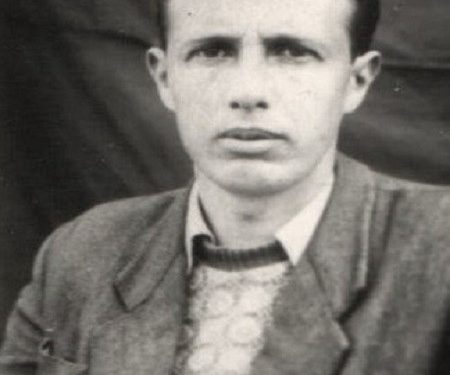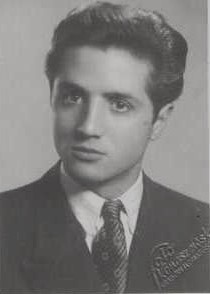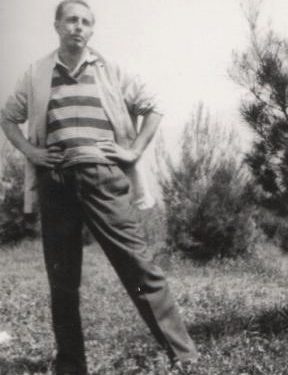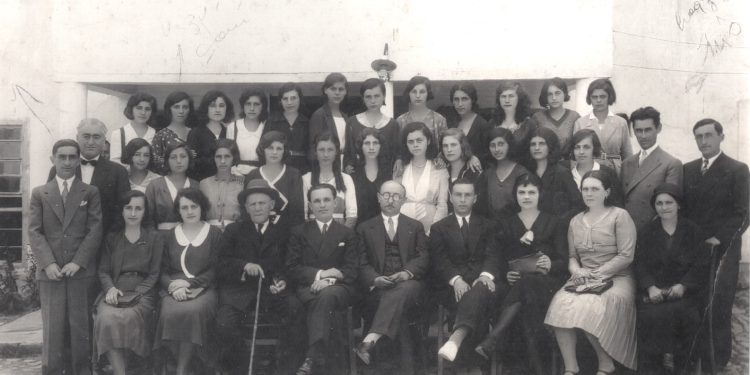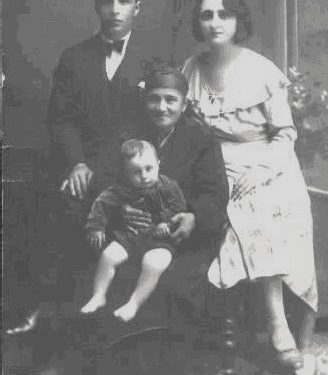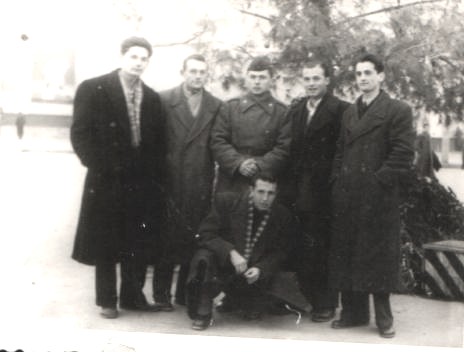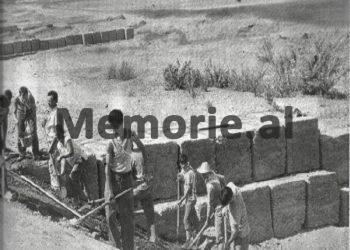By Robert Kostaq Cipo
Second part
Memorie.al / Linda in Korçë on Tuesday, September 16, 1930, at 10 o’clock in the morning. My parents were, Kostaq Cipo, son of Simon Cipo and Agnia (Juvani) Cipo, and Margarita (Papajani) Cipo, housewife, daughter of Doctor Filip Papajani and Angjeliqì (Kostantinescu) Papajani, housewife. When I was born, my father was a professor of Albanian language and literature as well as other literatures, except for French, at the Albanian-French National Lyceum in Korça, while Dr. Filip Papajani was the only doctor in the Pogradec district until the liberation of Albania, a patriot of the Independence period, writer and poet also mentioned in the Albanian Encyclopedic Dictionary.
Continues from last issue
They say that this person, (Stefan Prifti), who had no shred of honor left, was later engaged in scientific activity, publishing several studies. But were these valuable, before the humiliated honor, allowing this inhumane and barbaric act to be carried out, in the sacred institution of the school, where he, in the role of shepherd, was charged with protecting the students?! Let’s talk a little about the pseudo-classmates, those whom chance had brought to sit on the benches of that school, which always bore the honored name of Naim Frashëri.
Among these dirty faces, of an “emancipated” pseudo-communist system, we can mention the school’s ignorant chief, Theodhos B., nicknamed “Xoxi”, and then in turn, Perikli Sh. (after 1991 he entered the Italian Embassy and from there with his family he went to America, presenting himself as an anti-communist) Sirri J., Dashamir T., Dashamir H., Simon Ç., Hajredin Sh., Dhimosten B., Besnik B., Viktor R., and some other servile-dallkauks, who hoped that they would be able to win a scholarship (and some of them actually won), raised their hands voluntarily, against their friends, and this only because the Organization asked them. The irony of fate was that those who raised their hands each had a family member in prison. But can a man sit down so low?! We cannot leave without mentioning the dirtiest face, the chief spy of all time, the “honorable” Mikel G.
About this “magnificent” event in the official press of the time, two articles were published, one on October 4 in the “Voice of the People” newspaper with the title; “A fair measure” and one in the “Rinia” newspaper, in October 1949, with the title; “A suitable measure”. But can it be called a fair and appropriate measure, the beating of minor students inside the school premises, by people dressed in power?! Where is his grave today, this Spiro Panoja, to be dirty? Even in this case, my father didn’t give me any remarks, he just told me that; don’t waste your time, don’t despair, learn and study, because life is long. He also told me that; “Until you turn 18, you are under my care, as the law states and I am responsible for your actions, only after the age of 18, you will be responsible for your actions”.
But he wondered how students could be expelled from school for their political beliefs! Every time he talked at home, he was convinced that the student could be expelled from school, for lack of preparation in lessons, for continuous repeated absences, for negative grades in all lessons, etc., but he said, if this happens in western countries, where students constantly take to the streets and protest against the government’s policy, or in support of their striking parents, what if they were all expelled from school?! Schools should be closed.
During the post-internment period, when he was working as an inspector in the Ministry of Education, he had daily and very tough discussions with Ernest Koliq, the then Minister of Education, where each of them passionately and convincingly defended their political views and it did not occur to anyone, not even Ernest Koliq, to arrest Kostaq Cipo, only because he expressed his anti-fascist views, and even Cipoja, if he had had Ernest Koliq as his subordinate, when he became Minister of Education, would not have thought of it either , to denounce him for having fascist thoughts. But since Cipoja was not able to understand the Russian reality, which was being installed in Albania and his son was expelled from school, his advice was followed, that life is too long, and that school gives you skills, to earn a living mouth, while culture deals with books and continuous studies. He often cited Aesop in ancient Greece as an example to support this view.
And so it was. Almost every day I met with Bamir Çano, who was also excluded, and we both studied matura subjects together at Bamir’s house, or at mine. In the meantime, since I had a hand in drawing, following my own explanations and suggestions, I helped him in the preparation of cartoon sketches, to be published in a Phonetics text, on the movements that the vocal organs undergo during the pronunciation of letters. This state of expectation continued for almost a year, and when he noticed that despite his insistence, the decision on the exclusion was not being canceled, he became interested in finding me any kind of job, wherever it was, it was enough to increase the income in the family in some way.
But in December 1950, I was called to do military service. My father was extremely upset, as the person he himself had charged and complained about finding me a job, treacherously, this same person (he never revealed his name) went and informed the Military Branch, so that they could recruit me. . First, they send me to Krastë in Elbasan, to a genie ward, making the Tirana-Elbasan road on foot. But at my own insistence, I was transferred to Tirana, to be close to him, who was becoming more and more burdened by the disease every day, and provisionally, until the department where I would be assigned, to perform military service, was found. I settled for a few days as a host, in the Military Ward No. 3806, which was the Ward of Drivers of the General Command (Ministry of Defense).
There, luck struck me, because they had been looking for a typist (a rare profession at that time) for so long, to give the person who performed this task the opportunity to be released from military service. Then provisionally, since I knew how to work on the typewriter, they kept me there, until they found another soldier to do this job. For a certain period of one year, I was transferred to the Secretariat of the Economic Branch of the Supreme Court. There I was assigned as a typist and to help with the secretarial activities.
One day I had the chance to open the daily mail and in a letter addressed to the Ministry of Defense, I read that the Tirana Geniuses Department informed the Ministry that it was always waiting for the recruit Robert Cipo, who had been assigned to perform military service in their department. Without further ado, I take the letter and throw it in the wastebasket. After two months, another letter arrives again, with the same content, which ended up as the first. So there were no other requests and I continued to perform military service, in the Secretariat of the Economic Branch of the General Staff, passing for a certain period, as Chief Secretariat. And this waiting continued for almost two years, until it was time to be released from military service.
During the period of military service, I had the opportunity to get to know more closely, with generals Teme Sejko, with whom I greeted even after I was released from the army, with Petrit Duma, Rahman Parllaku, etc. Of my army friends, I remember most of them as faces, but I have forgotten their names, except for one of them, whom I became friends with. This is Mirush Cami, the driver of Petri Dumas, who at that time had only finished primary school. With my insistence, I socially forced him to continue school, first to finish the seventh grade and then the high school. Friendship with him still continues today, after 50 years of military life. From that period, I remember the drivers; Hasan Balla, Galip Mene and Riza Kasapi (Ferhati), who after his military service, worked as a bus driver on the Kombinat-Kinostudio line, but who died as soon as he retired.
Meanwhile, the state of my health was getting worse and worse, although he regularly went to work, as well as taught non-stop, at the Pedagogical Institute. By the end of 1951, he was hospitalized. Together with my brother, Ferdinand, we went almost every day to visit him. In the conversation he was completely conscious. As much as one day, he tells us; “I’m dying, take care mom and always stay close to each other. I was worried that I was not able to write my memories”.
He died on January 6, 1952. How the death happened and the funeral ceremony as well as other related aspects can be read in Prof. Monograph. Kostaq Cipos, written by me, published in 2004. I remember that for consolation, Sejfullah Maleshova, Tuk Jakova and Major Galip Sojli, a close friend of my uncle, national champion in the Marathon and 10,000 meters, who a few days later came later, he would try to cross the border with Yugoslavia, but was caught by the UDB. After returning to Albania, after many, many years, he is sentenced to 10 years in prison. After he was released from prison, I had the opportunity to meet the son, to whom I recommended that the father should start writing his memoirs. “We in the family also suggested it,” he answered, “but he claims that he has already lost his memory.”
After I was released from the army, since the decision to exclude us from the schools of Albania had been annulled, I applied and attended the fourth year of night school high school. There, I happened to have a bank friend, a student named Xhavit Struga, whom I did not know. Since we were supposed to have an hour off, we went out together for a walk in the streets of Tirana and I was impressed by the respect and rather the fear with which people greeted him, but without stopping to meet him. We had just started this tour, I want to say hello to my former high school friend, Gani Karapici. When he saw me in the company of this person, he was very surprised and I saw him make a gesture, as if he wanted to tell me; “how about you, how did you meet this person”?!
Later, by asking, I found out that he was the Military Prosecutor in the People’s Courts. From that day, I found the opportunity and changed the bank in the classroom, however, this acquaintance continued for a long time even after school, with greetings and exchange of ideas, especially about classical music, for which he said he was very passionate. He was highly regarded and often went with delegations abroad. But after returning from a government visit to China, he surprisingly died.
In the night school, I remember a classmate, named Hilmie Kosovrasti, who later, for a certain period, became close to my friend, Simon Deda, the football player of “Partizan”. I met Hilmi again, when I went to work at the Hospital, where she worked as a doctor. Later, she would become a deputy of the Democratic Party. Meanwhile, he had broken up with my friend, Simon. It was at this time, the year 1993, that Simon fell ill “from an infection in the large intestine” and died.
Before these events, I worked for a short period as a clerk in the Military Constructions Branch, on “Rrugë e Durres”, and then I was transferred to the Military Constructions Company, based in Rrapi Trishi. Here I met Bamir Çano, who was doing military service there, as a surveyor. From there, taking advantage of the fact that during this period, the punishment of expulsion from school was removed, I made a request to the Ministry of Education, for a right to study at the Higher Institute of Engineering, but despite all my efforts, they gave me the right, only for Geological Engineer. After doing a few months of lectures, since I was not placed in Electrical Engineering, I left, thinking that I would get a job, whatever.
And this situation of waiting and searching, from one place to another, continued for several years. Only in 1957, with the interest of my uncle, Dr. Virgjil Papajani, next to the Deputy Director of the Civil Hospital, Dr. Aleko Bozo, I worked as a typist in the Statistics Office of Hospital No. 1 in Tirana, where Sherif Klosi was the director. But even here, they did not leave me comfortable. The former classmate, who had participated in our beating, that we would be expelled, named Simon Ç., the son of Cin Ç., the former Director of the Bank of Albania, during the occupation period, who meanwhile had finished his studies as a doctor in the USSR, and as vigilant as he was, as soon as he saw me in the Hospital’s offices, he immediately notified the Chief of Staff, telling him that I had been expelled from all the schools in Albania and asking him to immediately remove me from my job.
Within 10 minutes of the denunciation, I was called into the framework, subjecting you to a series of questions, where the first question was; “why were you expelled from school”? I escaped without rest, only thanks to the intervention of the director of the Hospital, Dr. Sheriff Klosit. After a year, I was appointed Head of Statistics for the three hospitals and Secretary of the Medical Commission, for those who applied to be treated abroad. There I had the chance to get to know my former students, Prof. Fejzi Hoxhen, Prof. Dr. Xhavit Gjata, Prof. Dr. Pellumb Bitri, as well as with Prof. Dr. Ferdinand Paparisto, Prof. Dr. Petro Cani, Dr. Kristo Kristidhin, Dr. Besim Zyma, Dr. Qazim Bakallin, Dr. Tika Theodhosin, Dr. Nun Theodosin, etc. Staying in their company, I benefited a lot, both from the medical professional side and from the humanitarian side.
I also made friends with the doctors; Piro Vesho and Aleko Veshi, with Dr. Drini Ohrin, Dr. Josif Adham and his assistant, Dr. Milto Kostaqi, a classmate in high school, with my brother. I also had friendship with Dr. Nesti Boçka, who, although he found out that I had been expelled from all the Schools of Albania, maintained a friendly attitude, to be praised. While working at the Hospital, I had the opportunity to get to know Dr. Pandeli China, Dr. Enter (Cyne) Rusin, Dr. Ibrahim Dervishin, Dr. Pavlo Pavlin, who every time he would pass by my office, would knock on the window glass and shout in Italian; “Roberto, il Diavolo”.
I had the opportunity and became friends at the Institute of Hygiene with his son, Stefan Pavlin, also this doctor, a friendship that still continues today. There I made a close friendship with Dr. Česk Rrokun, the doctor of the Anatomy-Pathology Service, who had finished his studies in Prague and married a Czech, had a daughter. Because of this marriage, the case was found and he was transferred (interned) to Krujë, where he died in 1991 or 1992. They want to say that he was “forced to die” during the period of service in the Anatomy sector. – Pathology, had performed the autopsy, even of the persons eliminated by the State Security.
Since I was in charge of Statistics for all three hospitals, I also made friends with surgeons, such as Dr. Rushen Golem and many, many others, who today, after 40 years, also because of sclerosis, I remember as a sight, but I have forgotten your names. There I met and became friends (I can’t forget this) with the first Candidate of Medical Sciences that Albania had until then, with Dr. Fadil Spahiun. I always passed by his office in the Orthopedics Pavilion and we talked for a long time with him about writers and their books. He was from Kukësi. He had finished his studies in the Soviet Union and married a Soviet woman.
When he walked through the hospital, he would walk in front while his wife, at his request, walked a few meters behind, according to northern customs, since husband and wife cannot walk together. He had very high professional skills. When, in 1993, I was hospitalized and underwent prostate surgery, he decided to return for a few weeks from the Soviet Union, where he had gone after the events of 1991 and where he worked in one of the most famous clinics in Moscow. When he asked about me and found out from my friends that I was hospitalized and my wound was not closing, although 4 months had passed after the operation, he sent me word that; “Tell Robert to find the opportunity to come to me in Moscow, because I want to renew him.”
I remember that in his clinic, here in Hospital No. 2, another doctor, named Ali Spahia, also worked. In appearance, it was extremely ugly. Even with this, I had a lot of conversations, but he always remained aloof and scared. I understood that he had progressive thoughts, but they confused him badly and sentenced him to prison, which he served mainly in Hospital No. 2, in the Prison Pavilion. After 1990, he lived in Shkodër and got involved in the anti-communist movements, and then he was elected deputy and Chairman of the Parliamentary Group of the Democratic Party.
In the Hospital, I also had company with the doctor Fedhon Meksi, with the Hospital Pharmacist Dr. Erebara, who was sentenced to prison (I never found out why) and the other pharmacist, Ylber Fortuzin, who had married a Bulgarian woman, with whom we made social friends. I also made friends with Doctors Lumto Peçi (daughter of Shefqet Peçi), Perlanda Pirdeni (I had many friends with her two brothers) and Violeta Moskon.
I can’t forget Dr. Ylli Shtylla, the son of Dr. Medar Shtyllës, my father’s friend. Friendship with him continues even today. There I made friends with the newly graduated doctor, Stefan Vokopola (the son of the doctor, Mit Vokopola, from Durrës, who by chance, wanting to congratulate him on the occasion of the New Year 2005, my wife informed me on the phone that Stefani already had two month that he had died), as well as with his group mates; Jorgji Jani, Afrim Çeço, Ben Çeta (Benjamin Çeta), Nestor Polimeri, etc., who carried out post-university practice in the Hospital’s clinics.
I also made friends at the Pediatric Hospital with Prof. Selaudin Bekteshin, with his grandson Dr. Inis Boletini (nephew of Isa Boletini) with Dr. Krisavgji Rekë and with a group of pediatricians. Not forgetting a very large group of nurses from all three hospitals. In that period, I became very friendly with the neuropsychiatrist, Nestor Polimeri, from Elbasan. At his insistence, I also went to Elbasan and together with him; I visited the Psychiatric Ward, where Teme Sejko’s brother was “admitted”. I was also invited to his house, where I met his mother, over 60 years old, who I found reading an English novel. He explained to me that he had attended the course for girls at “Robert College” in Istanbul (the one that had been proposed to my mother, but the mentality of the time did not allow her to go). After 1991, Nestor also went abroad, to Greece, where he died (so they say) of brain cancer.
I think I overdid it with all these names. There in the Hospital, as I mentioned, I also met the doctor, Jorgji Jani, who had gone for specialization in Czechoslovakia and returned as a specialist in the production of ‘Gamma Globulin’. Because of the established friendship, I asked him to work under him as a Microbiologist. And so it was. In 1962, I transferred to his subordinate, in a ward that had just been opened in Hospital No. 2, where today the Pharmacy of this Hospital is located.
There I started working in the production of ‘Gamma Globulin’ in cold rooms’ with temperatures below -5°C. There I had workmates’ Hajredin Zajmin (who passed away in December 2005). Working there, without severance from work, I followed the one-year course for Microbiological Laboratory Technician, which I finished with grade 8 (diploma with the signature of Dr. Drini Ohri, Deputy Minister of Health, is in my documents). I must note that laboratory technician Lejla Stermasi, daughter of Aqif Bey, came to work here in this ward, with whom we befriended and later fell in love and married. From this marriage, two sons were born; Kostaqi in 1969 and Klodiani in 1975. Memorie.al
The next issue follows




